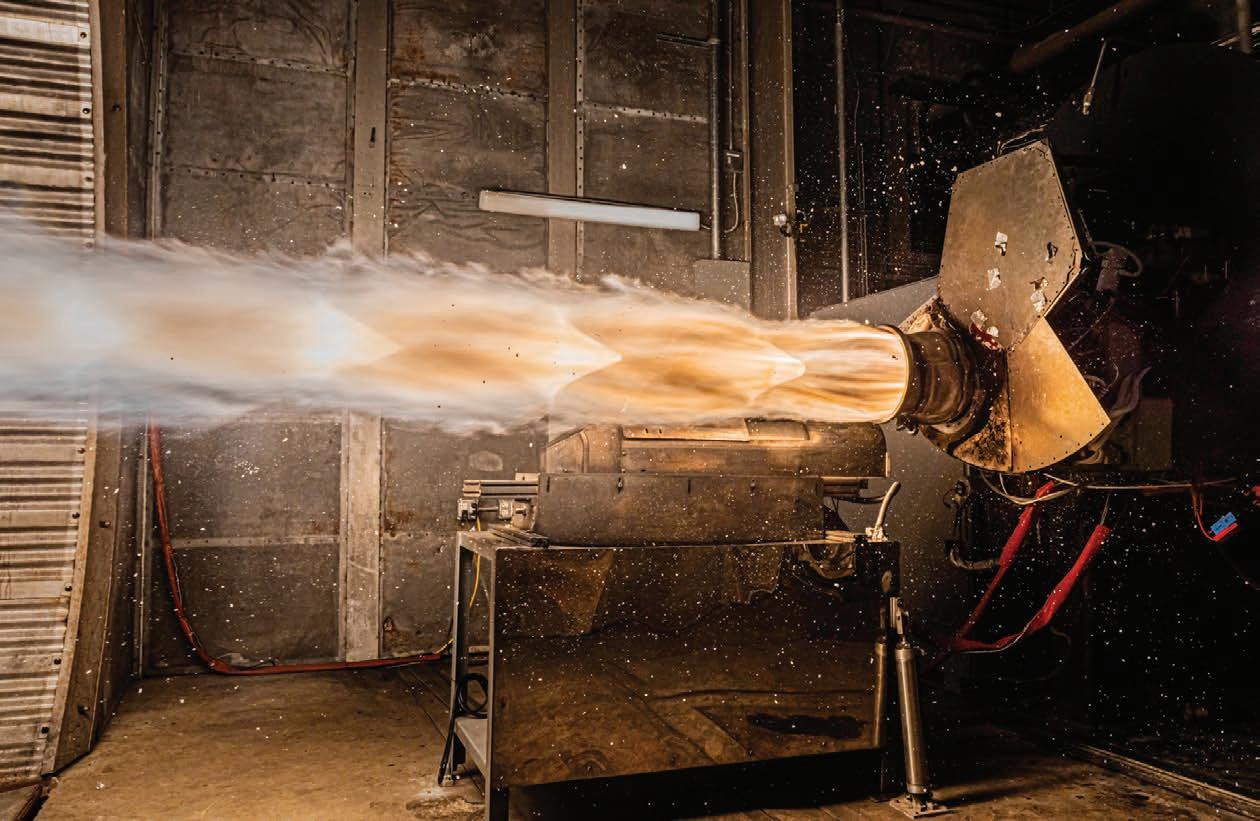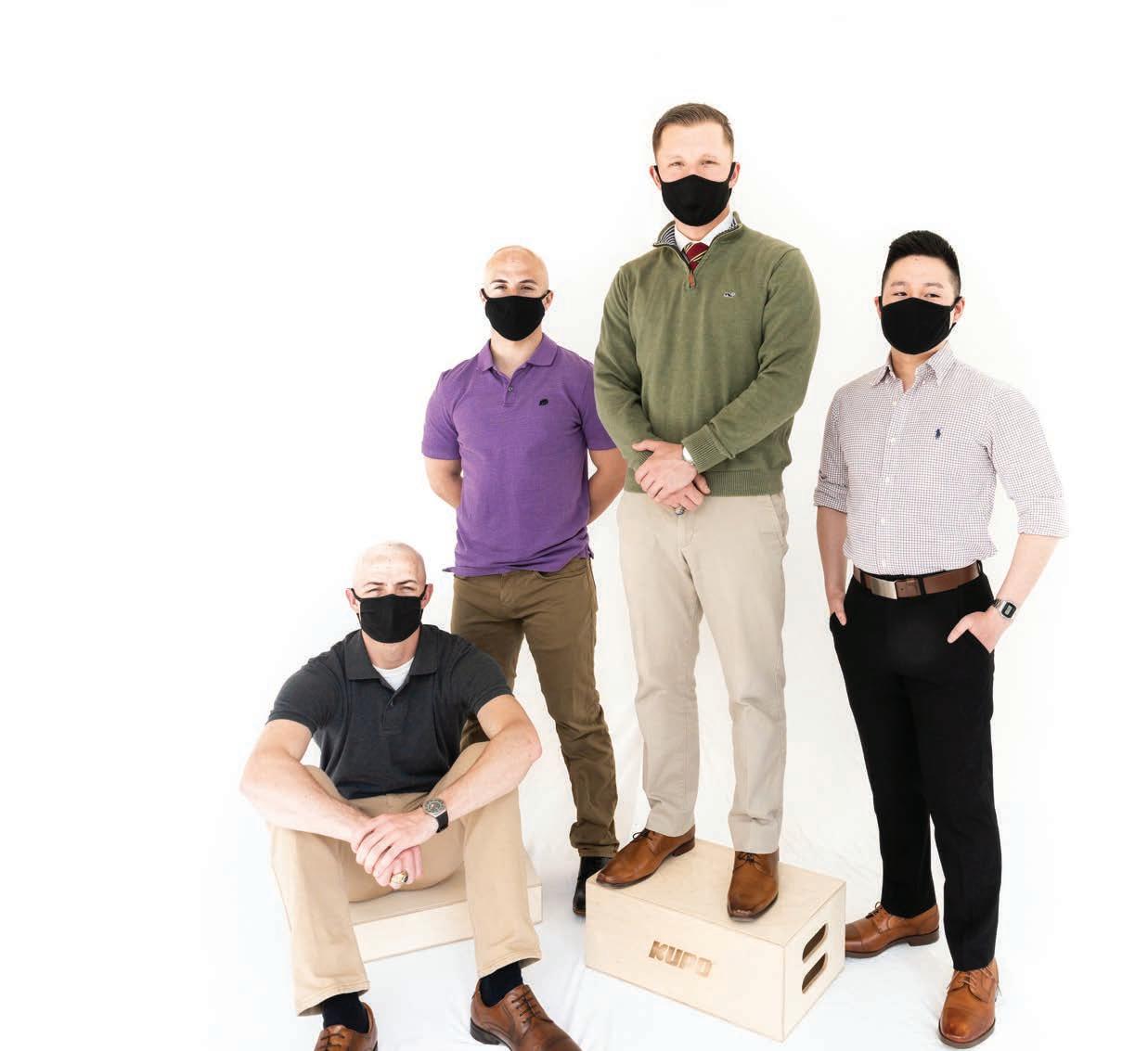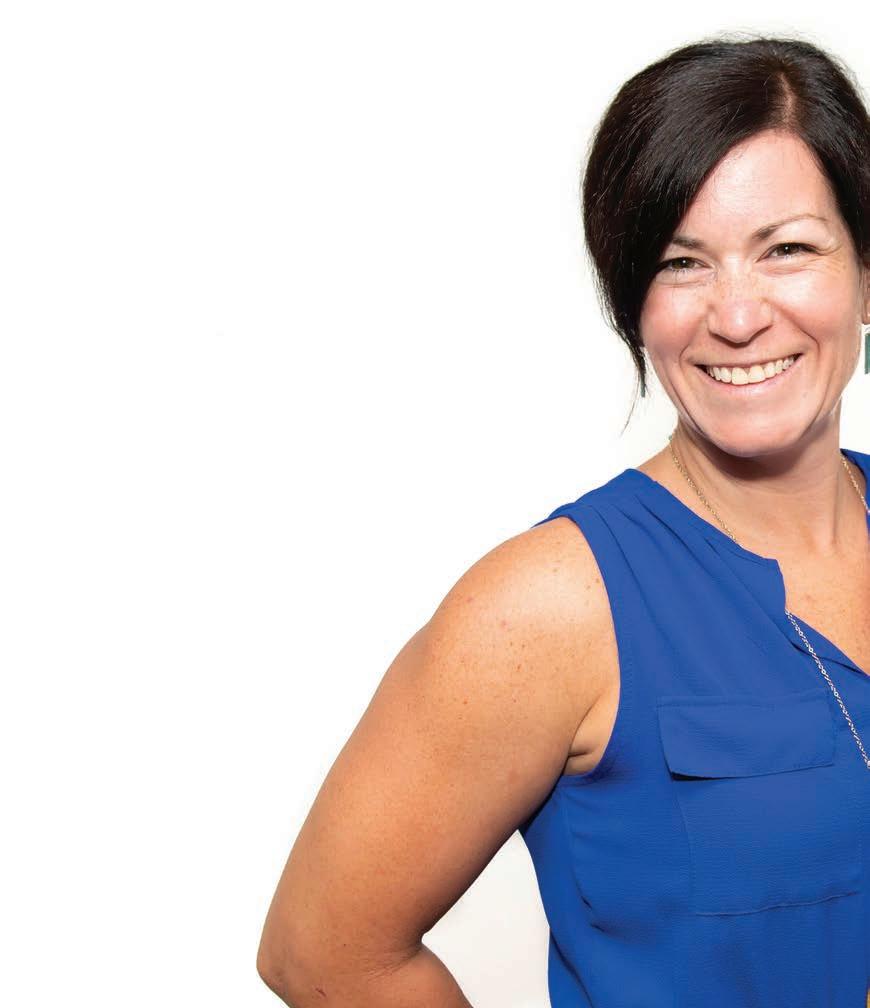
11 minute read
LEARNING ON THE JOB
Alaska Aerospace Corporation, where I work today, is a State of Alaska public corporation. The organization was developed back in the early 90s to diversify Alaska’s economy into the aerospace industry. We’re one of only four places in the U.S. that you can go to orbit with a vertical rocket. The company has been launching from Kodiak Island since ’98, but it’s really a new industry on the commercial side. I joined the company as president in 2018. I’m based in Anchorage, but our spaceport—called the Pacific Spaceport Complex–Alaska—is about a 45-minute flight south on Kodiak Island.
Governments and companies used to launch a satellite and expect it to be useful for five, ten, fifteen years. These satellites were exquisite engineering articles—multimillion-dollar, sometimes billion-dollar systems, designed to last for a long time and do a lot of things. Today, we’ve really seen a shift to small satellites and CubeSats, which are the size of a toaster oven or a microwave. You build a satellite, and maybe it lasts 18 months. It’s like our phones. We get a new smartphone about every 18 months or two years, and we refresh that technology. If we can lower the cost of the launch and lower the cost of a satellite, then we can have this refresh of technology much quicker in orbit, as well. That in turn drives more satellites being launched, making the industry more dynamic and vibrant.
Advertisement
Spaceports today are akin to what airports were in the 1920s and 1930s. I find that really exciting. There’s no playbook. Every day has new challenges. It’s exciting and a great time to be a professional in this great, growing industry. Especially now, when we see this renaissance of new space companies like SpaceX, Virgin Galactic, Blue Origin, Astra, Rocket Lab, and others. It’s inspiring to see the pace of progress. I am crossing my fingers we can get to Mars while I’m still around. How do we bring humans to another planet? But space also is still very much about, how do we make life better on Earth? We use GPS satellites to navigate. We use satellite images to understand what’s going on in the world, tracking polar ice and the weather and so on. Space is also about, how do we explore? How do we then transport faster around the Earth? I think that’s one of the next exciting pieces. We talk about FedEx being fast. But wait until space travel happens. n
—As told to Sean Markey
CAREERS
Learning on the Job
Internships help Norwich students gain valuable experience for their future careers
BY BETH LUBERECKI
STATE GOVERNMENT Victor Hinojosa ’21 interned for Vermont Gov. Phil Scott during his freshman year at Norwich.
Photograph by Mark Collier
CITYLAB: DC Andre J. Rodriguez ’21, seen here outside the U.S. Supreme Court with his father, spent a semester interning for a defense contractor.

Photograph courtesy Andre J. Rodriguez ’21 V ictor Hinojosa ’21 has big plans for the future. Even before graduating from Norwich, he had already begun working as a police officer in Berlin, Vt. His post-graduation trajectory includes continuing to work in law enforcement plus commissioning in the Army Reserve as a military police officer.
But that’s just the beginning. “Eventually, I want to run for some sort of office,” Hinojosa says. “My long-term goal is governor of Vermont.”
He’s already gotten an inside look at that position from an internship he held in Vermont Governor Phil Scott’s office while a student at Norwich. Among other tasks, the political science major helped answer phone calls, emails, and letters from constituents across the state who had wide-ranging opinions about policies.
“I learned a lot,” Hinojosa says. “I learned how to deal with people from all walks of life. And it’s a huge resume builder, because not everyone you come across can say they interned for [their] governor.”
Internships are becoming an increasingly important career stepping stone for college students. According to the Job Outlook 2017 Survey from the National Association of Colleges and Employers, more than 90 percent of employers prefer that job candidates have work experience, and 65 percent of that group prefer candidates with relevant work experience. The association’s 2019 Student Survey Report found that students who had completed a paid internship received almost 50 percent more job offers than students who had held unpaid internships or no internships at all.
“It’s really one of the most important things that employers look for on a résumé—some type of prior experience in the field,” says Jim Graves, assistant director/internship coordinator at NU’s Career and Internship Center.
Graves helps get the word out about internship opportunities to current students, as well as to academic department faculty and staff. Some majors—architecture, nursing, communications and English—require students to complete internships before graduating. For other majors, it’s strongly recommended.
“We want students to apply their classroom learning in a professional environment,” says Jason F. Jagemann, associate professor of political science. “We want them to gain exposure to their chosen field in the ‘real world’ and establish critical networking connections.”
Students have opportunities to complete internships during the school year or over the summer. Some stay close to campus. Jagemann says political science majors have interned with the Vermont Legislature and Attorney General’s Office, as well as with organizations such as the Vermont Fuel Dealers Association and Vermont Chamber of Commerce.
Some English and communications majors have held internships on-campus for the NU Athletics Department, student radio station WNUB, and The Chameleon literary journal. Others have ventured off-campus to places like Burlington television station WCAX-TV. Sean Prentiss, associate professor of English, plans to work with Graves of the Career and Internship Center to increase those kinds of opportunities.
“We’re trying to get students off-campus more, so they get more real-world experience where there’s more ramifications and more job opportunities afterward,” Prentiss says. “The bigger idea is that hopefully you get your foot in the door with these organizations and one of two things happens: Either they love you, and they offer you a job. Or, if that doesn’t happen, now at least you’re building up your resume with off-campus activities. You’re looking more like a writer, a newscaster, whatever career you want to be in. You learn how to talk that language and how to behave in that sort of role.”
Other students choose to do internships over the summer closer to where their parents live or opt for experiences like the university’s CityLAB program, where students can spend a semester in Denver, Boston, or Washington, D.C., working at an internship while also taking classes online. (The program also offers opportunities internationally in Berlin, Germany, and the U.S. Virgin Islands.)
Norwich secures housing for CityLAB students, who live as a cohort in each city. The cost is the same as a semester on the Northfield campus, which is appealing for many students.
“I think the draw is getting the experience and the fact that it is cost neutral,” says Linn Caroleo, director of operations for high impact practices at Norwich. “Students also learn how to navigate a city; there’s a little bit of growing up that happens. I have even had a student say that this program changed the trajectory of his life.”
Andre J. Rodriguez ’21 landed a job through his senior-year CityLAB: DC experience. The financial economics major interned with Assertive Professionals, a government contracting agency for the Department of Defense that offered him a full-time position in finance.
“The value of an internship is definitely get-

A CITY FOR A CAMPUS Amy Demczyszyn ’21 (left) gained valuable nursing experience during her CityLAB: DC work experience.
Photograph courtesy Amy Demczyszyn ’21
ting your foot in the door,” he says. “I don’t think it’s good enough nowadays to just graduate from college and expect to be handed a job afterward. Getting some experience is only going to benefit you when you apply for a job against one of your peers who may not have had an internship.”
Rodriguez enjoyed getting the chance to apply what he had learned in class in an actual business setting. That kind of experience can give students useful insight as they plan for their career.
“Much of what is done on campus is wonderful, but it’s theoretical,” Prentiss says. “These internships allow [students] to see what a field is really like, to see what works for who they are and what doesn’t to help them learn how to be a good worker. And it also helps them recognize what they don’t want to do.”
Georgeanna Stapleton, a youth probation officer for the Vermont Department of Corrections, who has worked with Norwich student interns for about five years, sees the value in gaining that kind of perspective. “Some interns have walked out of here going, ‘That is not a job I want to do,’ which is fine,” she says.
Many of her interns come in with goals of becoming a police officer, and the experience helps them see another component of the criminal justice system. “A lot of people have had their eyes opened quite widely, and it’s made them [see] there are a lot of sides to the justice system,” Stapleton says.
A great internship combines relevant career experience with valuable life experience like that. Nursing major Amy Demczyszyn ’21 also took part in the CityLAB: DC program. She says it helped prepare her to commission in the U.S. Navy and serve as a nurse in Okinawa, Japan.
Interning and living in D.C. “was a whole different environment for me that has been helpful in making me a more well-rounded nurse,” she says. “I got experience with patients in certain conditions that I wouldn’t really see in Vermont. It helped me apply my skills and learn things that I don’t think I necessarily would have learned by just staying in Vermont. I feel like it really prepared me to be able to step out of my comfort zone.”
At the Career and Internship Center, Graves helps students sort through all the different internship opportunities and navigate the process of completing an internship for credit. He also reaches out to employers and alumni to help create these opportunities for students.
“I think Norwich has a caliber of students who are disciplined, schooled in leadership, and able to work well as a team member,” he says. “In terms of our employer satisfaction, we get very, very positive evaluations on our interns.”
While a student at Norwich, Meghan Kennedy ’12 & M’14 served as an intern for the Department of Homeland Security and wound up getting a fulltime job with the agency. Now working as an intelligence research specialist for U.S. Customs and Border Protection, she’s helping current Norwich students explore career options and build their resumes through internships there.
“I gained real-life experience through my internship and was able to learn skills that I could apply in future positions,” Kennedy says. “After Norwich helped me out with getting a foot in the door, I wanted to pay it forward.”
She says that one of the things that attracted her to Norwich as a student was learning about the concept of “Norwich hires Norwich.” “I’ve definitely seen that in full force,” she says. “It’s a small community and campus that’s represented really widely. It doesn’t matter where you’re headed or you end up going, you’re going to run into someone from Norwich everywhere.”
National Life Group in Montpelier has been hosting Norwich student interns for about seven years. “I have noticed qualities like pride in work, responsibility, and a focus on learning and deep understanding of our business,” says Meg Gras, talent acquisition consultant for the insurance and financial services company. “It’s a no-brainer to work with Norwich students, because they add a lot of value.”
Gras says everyone involved benefits from the internship relationship. “We’re teaching students and giving them an awesome experience and exposure to real work,” she says. “And then what we get back is a fresh set of eyes and new ways of thinking about things.” Internships also serve as a talent pipeline for the company, which has hired on some Norwich interns full-time.
Prentiss believes that Norwich’s focus on service and leadership makes its students great internship candidates. “Our students learn two ways to be leaders,” he says. “One of them is to be great followers, and that’s what an intern needs to be a lot of times. They need to shut up, listen, work hard, be dedicated, and do what’s asked of them. And that’s what our students are trained to do, especially in the Corps of Cadets. But then they also need to take over at times and find their own vision, and they’ve been trained to do that, as well. Most schools don’t teach students those sorts of things.” n










